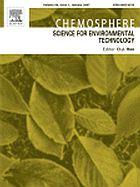|
Literature / Source Database:
Chemosphere
Description
Chemistry, Biology and Toxicology as Related to Environmental Problems
| Title (short) |
Chemosphere |
| CODEN |
CMSHAF |
| Languages |
English |
| First year |
1974 |
| Impact factor |
3.698 |
| Editor |
O. Hutzinger |
|
|

|
Status
active
Indexing
Analytical Abstracts, Aqualine Abstracts, BIOSIS,
Cambridge Scientific Abstracts, Chemical Abstracts, Current Contents/Agriculture, Biology & Environmental Sciences, EMBASE, Elsevier BIOBASE, Environmental Periodicals Bibliography, MEDLINE®, PASCA
Subject

Source type
Journal
Publisher
ISBN ISSN
0045-6535
First volume
1
Last volume
68+
Homepage
| Resources |
|
Availability |
|
|
|
|
|
| Text PDF |
 |
free access |
 |
| Text Html |
 |
for subscriber |
 |
| References |
 |
not available |
 |
| Abstracts |
 |
|
|
| TOC |
 |
|
|
|
|
|
|

Description
Chemosphere is an international journal designed for the rapid publication of original communications as well as review articles. Chemosphere, as a multidisciplinary journal, offers maximum dissemination of investigations related to all aspects of environmental science. Chemosphere will publish:
- Original communications describing important new discoveries or further developments in important fields of investigation related to the environment and human health
- Reviews, mainly of new developing areas of environmental science
- Special, themed issues on relevant topics.
The following sections and subject fields are included:
Persistent Organic Pollutants and Dioxins
- All papers related to persistent organic pollutants Dioxin conference proceedings are published annually.
Environmental Chemistry
This section will publish manuscripts dealing with fundamental processes in the environment that are related to dispersion, degradation and alteration of inorganic and organic contaminants of environmental concern focussed on the dynamics of contaminants in environmental compartments such as water, soil/sediment, and air and their interactions with biosphere. Specific topics of interest include: - Environmental fate studies including transport, biodegradation, bio-accumulation and/or deposition as well as atmospheric (photo)chemical processes, hydrolysis, adsorption/desorption.
- Soil and water chemistry focussed on interaction, degradation and speciation aspects of environmental contaminants
- Novel environmental analytical methods including case studies
- Phytoremediation employing new strategies, findings or interpretations of general interest.
- Development and application of environmental modelling and quantitative structure-activity relationships to study fate and environmental dynamics
- Monitoring studies presenting new strategies, report of novel contaminants, findings or interpretations of general interest for an international readership. Monitoring studies based on standard methodology, and of regional importance, are not considered. Studies dealing only with nutrients in agricultural ecosystems are not considered.
Environmental Toxicology and Risk Assessment
- Ecotoxicology: aquatic and terrestrial
- Animal toxicology
- Endocrine disruptors
- Epidemiology
- Biochemistry
- Pharmacokinetics/metabolism
- Testing methods
- Occupational Hazards and Exposure
Science for Environmental Technology
- Advanced water and wastewater treatment process
- Incineration
- Remediation
- Hazardous Waste – industrial chemicals
- Green Chemistry
Related links:
|